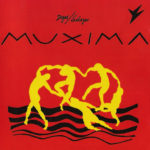
Tread lightly, oh you who hate slap bass. Jorge Degas and Marcelo Salazar’s positively radiant Muxima has only two roles pushing all songs along: drum and percussion. Apropos they would remix Matisse’s “The Dance” into their own Afro-centered interpretative design. Deep, deep, Brazilian jazz funk that frequently oversteps its boundaries to go into the realm of minimalism, fourth world, and all sorts of other places, to label the music of Muxima “Jazz” or “funk” would be to poorly signify what they’re attempting to accomplish.

It was only five years before that this duo led by bassist Jorge Degas and multi-percussionist Marcelo Salazar left Brazilian audiences in a tizzy, trying to figure out what what to make of their debut União. Entirely self-taught, Jorge Degas played the bass more like a percussionist; plucking and slapping at the strings, only he knew how close to mimic the candomblé music of his parents and kin, in ways that most bassist wouldn’t even think of approaching the instrument. Marcelo Salazar, the wunderkind percussionist of Brazilian session circles, had grown tired of the shapeless intricacies of Jazz music. With Jorge, Marcelo could experiment with and rediscover the music of janeiros and of Afro-Brazilian folklore.
Where Jorge, the autodidact, would transform personal study into unheard of Brazilian grooves, Marcelo would often create his own instruments to create percussive sounds he simply couldn’t find in existing instruments. Tracks from União like “Ilha Grande” and “Missa” remain inspiring examples of candomblé ideas with future thought placed firmly in their head. Imagined percussion, creating life sound, crackling around some of the snakiest grooves you’ll ever hear, played by Jorge Degas and featuring the priceless arrangements of Jaques Morelenbaum from pioneering Brazilian avant-prog band A Barca do Sol.
Recorded in Rio, Muxima, tries to be at once more elemental and minimal than their debut. On this release all string instruments would be handled by Jorge and all percussion and sound effects by Marcelo. “Pulo Do Gato” intros the album immediately with a duet between bongos and what sounds like the Jorge’s bass going through a traffic jam only to mutate into feverish pass over feverish pass. As the album begins proper, Milton Nascimento’s “Ponta De Arena” gets treated to a haunting rendition that takes all the air of the original and expands on it. So dialed in are these two, that “Felicidade”, something that wouldn’t sound out of place on a great Elis Regina album, has all these gorgeous hints of experimentation hovering around it’s edges, making a simple samba sound grander than its parts.
You can count on one hand the amount of instrumentation in “Agoroci” and “Valearia”, yet the remarkable musicianship places it firmly as winding orchestrations with enough fascinating twists and turns to get your toe tapping and head noodling at the same time. A perfect meeting of the mind and booty, Muxima lands in rarefied territory. Has Jobim’s “Triste” sounded as elegiac as their minimal arrangement of it? I don’t know, but Muxima lands even deeper questions just with little to say.
